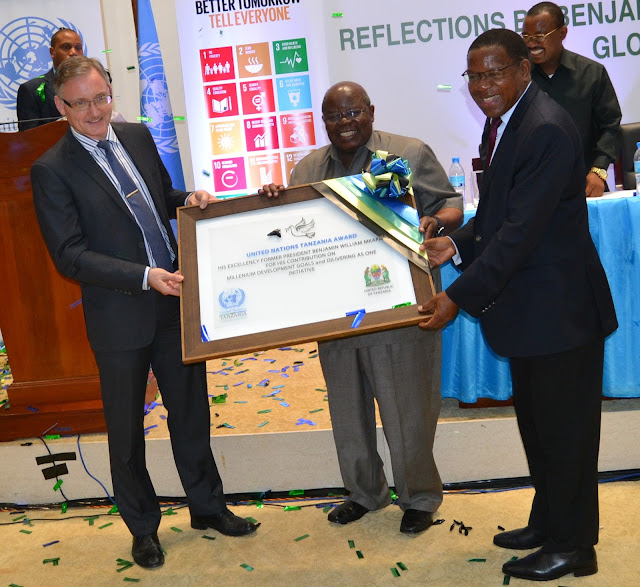Rais Mstaafu wa awamu ya tatu Mhe. Benjamin William Mkapa, akizungumza kwenye Kongamano la Vijana kuadhimisha miaka 70 ya Umoja wa Mataifa. Kongamano hilo lilifanyika leo tarehe 12-10-2015 katika ukumbi wa mikutano wa kimataifa wa Julius Nyerere jijini Dar es Salaam.

Waheshimiwa Mabalozi, Maofisa wa Wizara ya Mambo ya Nje na Ushirikiano wa Kimataifa, Maofisa wa Umoja wa Mataifa, wanafunzi wa vyuo vikuu na Sekondari wakimsikiliza kwa makini Rais Mstaafu Mhe. Benjamin Mkapa akizungumza juu ya maoni yake kuhusu Umoja wa Mataifa.

Waziri wa Mambo ya Nje na Ushirikiano wa Kimataifa, Mhe. Bernard Membe akizungumza katika kongamano hilo lililoandaliwa na Wizara ya Mambo ya Nje kwa kushirikiana na Umoja wa Mataifa.

Naibu Katibu Mkuu Wizara ya Mambo ya Nje na Ushirikiano wa Kimataifa, Balozi Simba Yahaya (wa kwanza kulia) pamoja na washiriki wengine na wakimsikiliza kwa makini Rais Mstaafu Mhe. Benjamin Mkapa katika siku hiyo ya maadhimisho ya miaka 70 ya Umoja wa Mataifa.

Katibu Mkuu wa Wizara ya Mambo ya Nje na Ushirikiano wa Kimataifa, Balozi Liberata Mulamula akitoa neno la shukrani wakati wa Kongamano la Vijana kama sehemu ya maadhimisho ya miaka 70 ya Umoja wa Mataifa.

Baadhi ya Maofisa wa Wizara ya Mambo ya Nje na Ushirikiano wa Kimataifa,wakifuatilia mazungumzo na mjadala kuhusu changamoto za Umoja wa Mataifa

Mratibu Mkazi wa Umoja wa Mataifa Bw. Alvaro Rodriguez akizungumza katika kwenye kongamano hilo lililohudhuriwa na wanafunzi wa vyuo mbalimbali vilivyoko Dar es salaam kama sehemu ya maadhimisho ya miaka 70 ya Umoja wa Mataifa.

Baadhi ya washiriki wakimsikiliza Rais mstaafu Benjamin William Mkapa.

Mkuu wa Kitengo cha Mawasiliano Serikalini na Msemaji wa Wizara ya Mambo ya Nje na Ushirikiano wa Kimataifa Bi. Mindi Kasiga, ambaye alikuwa muendeshaji wa mjadala wa Kongamano hilo akipokea maswali kutoka kwa washiriki.

Baadhi ya Wanafunzi waliohudhuria nao wakisikiliza kwa makini.
Baadhi ya Mabalozi na Maofisa wa Umoja wa Mataifa wakifuatilia moja ya hotuba zilizokua zikitolewa katika katika kongamano hilo.
Balozi wa Ujerumani nchini Tanzania Mhe. Egon Kochanke naye akitoa mchango wake kwenye Kongamano hilo.
Mkurugenzi wa Idara ya Ushirikiano wa Kimataifa katika Wizara ya Mambo ya Nje na Ushirikiano wa Kimataifa, Balozi Celestine Mushy, akichangia kwenye mjadala.

Balozi wa Japan nchini Tanzania, Mhe. Masahau Yoshinda akichangia jambo katika mjadala huo.

Mwanachuo kutoka Chuo Kikuu cha Dar es Salaam, Kisari Kangati Kisari akitoa mchango wake.

Mwanachuo kutoka Chuo Kikuu cha Dar es Salaam, Nassoro Kitunda, akitoa mchango wake katika siku ya maadhimisho hayo.

Fadhili Meta kutoka Youth CAN, naye akichangia hoja.

Revocatus Lule Ouigo kutoka chuo cha Diplomasia, akizungumza katika maadhimisho hayo.

Blesira Mukandala, Mwanafunzi kutoka Chuo cha Ustawi wa Jamii, akitoa mchango wake katika Kongamano hilo lililoandaliwa kwa ushirikiano wa Wizara ya Mambo ya Nje na Umoja wa Mataifa Tanzania.

Naibu Waziri Wizara ya Mambo ya Nje na Ushirikiano wa Kimataifa, Mhe. Dkt. Mahadhi Juma Maalim (Mb.), wa kwanza kushoto, akichangia jambo katika kongamano hilo.

Rais Mstaafu wa awamu ya tatu Mhe. Benjamin William Mkapa, akijibu hoja mbalimbali zilizojitokeza wakati wahusika walipokua wakijadili mafanikio na changamoto zinazoukabili Umoja wa Mataifa katika kipindi cha miaka 70.
Kongamano likiendelea.
JUU NA CHINI: Mratibu Mkazi wa Umoja wa Mataifa Bw. Alvaro Rodriguez na Waziri wa Mambo ya Nje na Ushirikiano wa Kimataifa, Mhe. Bernard Membe (Mb.), wakimpatia zawadi Mhe. Benjamini Mkapa kwa mchango wake kwenye kazi za Umoja wa Mataifa nchini Tanzania
Picha ya pamoja.
============================
PICHA NA: REUBEN MCHOME.







































